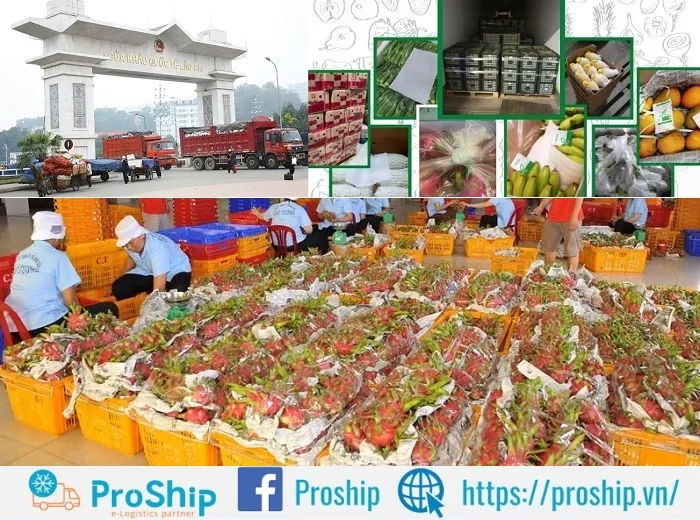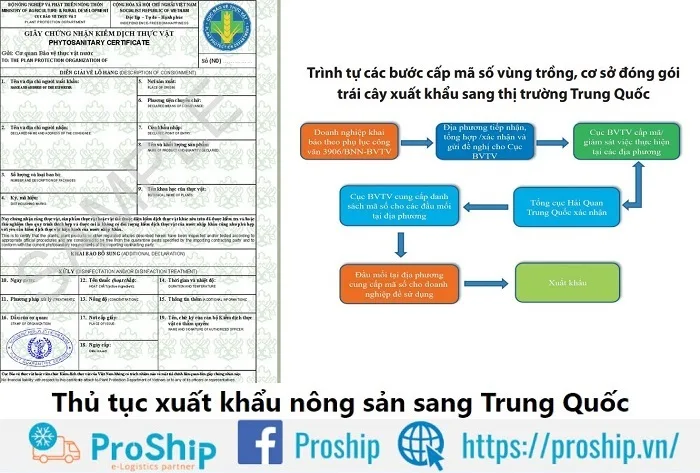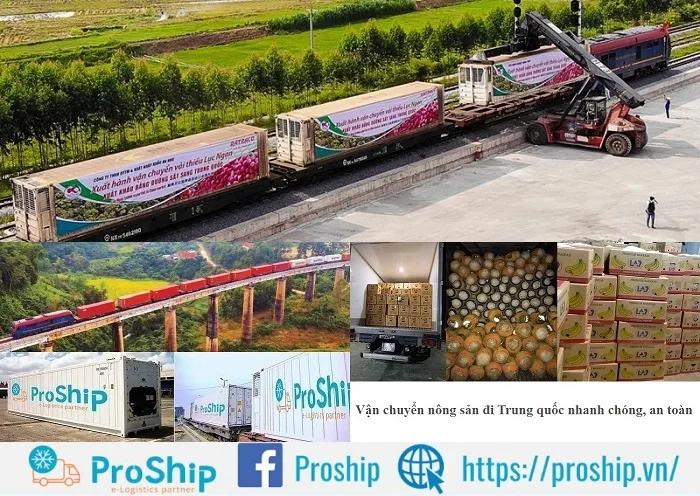x Các hộ kinh doanh, thương buôn, chủ vườn,…cần xuất khẩu trái cây, rau củ quả sang thị trường Trung Quốc?
x Các Doanh nghiệp chưa rành về bộ hộ sơ xuất khẩu, thủ tục xuất khẩu nông sản chính ngạch sang “đất nước tỷ dân”?
x Bạn cần tới sự hỗ trợ của một Đơn vị vận chuyển, logistics giàu kinh nghiệm XK hàng Việt – Trung trọn gói giá rẻ?
Việt Nam có nhiều tỉnh có đường biên giới tiếp giáp Trung Quốc nên hoạt động xuất khẩu nông sản sang Trung Quốc diễn ra vô cùng thuận lợi và nhanh chóng. Thông qua bài chia sẻ này, Proship.vn sẽ chuyển tải kiến thức về thủ tục xuất khẩu nông sản sang Trung Quốc đường chính ngạch cho các tư nhân, doanh nghiệp, nhà vườn tiện tham khảo và chuẩn bị một bộ hồ sơ xuất khẩu đầy đủ, cần thiết theo quy định nước bạn. Bên cạnh đó, nếu quý khách có nhu cầu sử dụng Dịch vụ vận chuyển nông sản, trái cây đi Trung Quốc bằng container đường sắt có thể tham khảo dịch vụ tại Proship Logistics.
🌐 Hotline Liên Hệ Vận Chuyển Quốc Tế
🧭 Miền Trung
Nhu cầu nhập khẩu nông sản Việt Nam từ Trung Quốc như thế nào?
Với lợi thế về mặt vị trí địa lý, những đặc điểm chung về nét văn hóa, Trung Quốc đang là thị trường tiêu thụ hàng hóa lớn nhất của nước ta. Trong đó, nông sản là một trong những ngành hàng được xuất khẩu nhiều nhất sang thị trường tỷ dân này. Song để có thể xuất khẩu nông sản sang Trung Quốc mọi người sẽ phải thực hiện nhiều thủ tục khác nhau mà không phải Cá nhân hoặc Doanh nghiệp nào cũng nắm rõ.
Trên thực tế nhiều người nghĩ rằng, Việt Nam là thị trường tiêu thụ hàng hóa chính của Trung Quốc bởi sự xuất hiện đa dạng của các loại hàng hóa này ở thị trường Việt nhưng đây lại là hình thức 2 chiều. Nghĩa là Việt Nam là thị trường tiêu thụ hàng hóa chính của Trung Quốc (và ngược lại), đây cũng là một thị trường tiềm năng của Việt Nam để xuất khẩu các loại hàng hóa, không chỉ nông sản.
Trung Quốc là quốc gia đông dân nhất thế giới với hơn 1,4 tỷ người và đang không ngừng tăng lên. Vì vậy, nguồn nông sản trong nước khó lòng có thể đáp ứng nhu cầu và nhập khẩu từ các nước bên ngoài là phương pháp hiệu quả. Đây là điều hết sức cần thiết và Việt Nam với vị trí địa lý thuận lợi sẽ là đối tác nhập hàng tốt nhất. Theo thống kê, tình hình xuất khẩu nông sản đang chiếm tới 27% trong tổng kim ngạch xuất khẩu nông sản, thủy sản của nước ta với các loại mặt hàng chủ yếu như cà phê, rau quả, sắn, gạo,…
Trong khi đó, Việt Nam lại là một trong những quốc gia phát triển dựa vào lĩnh vực nông nghiệp khá nhiều, nền kinh tế đi lên từ việc xuất khẩu các loại mặt hàng như ngô, lúa, khoai, sắn, hoa quả,…ra các nước khác. Tuy chậm hơn nếu so với các lĩnh vực công nghệ tại các quốc gia khác thì lại chính là tiền đề giúp việc phát triển các lĩnh vực khác như du lịch, thương mại,…

Hơn nữa, nông sản Việt Nam hiện cũng được áp dụng các phương pháp chăm sóc, công nghệ tiên tiến trên thế giới để chăm sóc nông thủy sản, góp phần bảo vệ sức khỏe người tiêu dùng. Việc Trung Quốc áp dụng các quy tắc nhập khẩu sẽ góp phần không nhỏ tác động trực tiếp đến một số loại nông sản của Việt Nam. Điều này khiến người nông dân rất chú trọng đến các hình thức đầu tư để tránh rủi ro, đảm bảo mang đến lợi nhuận khi đầu tư giúp nâng cao chất lượng nông sản xuất khẩu ra nước ngoài.
Việt Nam luôn tuân thủ theo quy định của Trung Quốc khi chỉ được phép xuất khẩu 9 loại trái cây gồm xoài, thanh long, dưa hấu, vải, nhã, chuối, chôm chôm, mít và măng cụt. Cho đến gần 2 năm trở lại đây, sau 4 năm thương lượng, sầu riêng Việt Nam mới chính thức gia nhập danh sách hàng nông sản xuất khẩu sang Trung Quốc.
Tính tới thời điểm hiện tại, giữa Việt Nam và Trung Quốc đều tham gia Hiệp định thương mại tự do ACFTA nên xuất khẩu nông sản sang Trung Quốc được duyệt nhanh hơn cũng như thuế có rất nhiều ưu đãi…Đây được xem là cơ hội thuận lợi để phát triển nền kinh tế Việt Nam. Vậy thủ tục xuất khẩu nông sản sang Trung Quốc bao gồm những loại giấy tờ, hồ sơ gì? Câu trả lời sẽ được Proship Logistics giải đáp ngay sau đây.
Cập nhật thủ tục xuất khẩu nông sản đi Trung Quốc chi tiết từ A – Z
Muốn nhập khẩu các mặt hàng nông sản vào thị trường “tỷ dân”, trước tiên bạn cần nắm được toàn bộ quy trình, thủ tục xuất khẩu nông sản sang Trung Quốc. Cụ thể như sau:
Mức thuế, phí xuất khẩu nông sản đi Trung Quốc
Rau củ quả xuất khẩu có phải chịu thuế xuất khẩu, thuế VAT không?
Khi xuất khẩu rau quả, Doanh nghiệp KHÔNG PHẢI nộp thuế xuất khẩu. Đối với thuế giá trị gia tăng, hàng hóa xuất khẩu được áp dụng mức thuế suất Giá trị gia tăng là 0% theo Thông tư số 14/VBHN-BTC ngày 09 tháng 5 năm 2019 của Bộ Tài chính hướng dẫn thi hành Luật Thuế giá trị gia tăng và Nghị định số 209/2013/NĐ-CP ngày 18 tháng 12 năm 2013 của Chính phủ quy định chi tiết và hướng dẫn thi hành một số điều của Luật Thuế giá trị gia tăng.
Rau củ quả xuất khẩu phải chịu phí gì?
Doanh nghiệp khi làm thủ tục xuất khẩu nông sản thực hiện theo Thông tư số 14/2021/TT-BTC ngày 18 tháng 02 năm 2021 của Bộ Tài chính quy định mức thu, chế độ thu, nộp, quản lý và sử dụng phí hải quan và lệ phí hàng hóa, phường tiện vận tải quá cảnh.
Văn bản liên quan của Trung Quốc về nhập khẩu nông sản
Các văn bản liên quan của Trung Quốc đối với nhập khẩu nông sản, Doanh nghiệp Việt Nam cần biết:
- Luật của Cộng hòa Nhân dân Trung Hoa về kiểm dịch động thực vật xuất nhập cảnh (Ban hành: ngày 01 tháng 4 năm 1992);
- Quy định về việc thực hiện Luật của Cộng hòa Nhân dân Trung Hoa về Kiểm dịch động thực vật xuất nhập cảnh (Ban hành: ngày 01 tháng 01 năm 1997);
- Luật An toàn Thực phẩm của Cộng hòa Nhân dân Trung Hoa (Sửa đổi: ngày 01 tháng 6 năm 2015);
- Quy định về việc thực hiện Luật An toàn Thực phẩm của Cộng hòa Nhân dân Trung Hoa (Ban hành: ngày 01 tháng 12 năm 2019).
Bộ chứng từ xuất khẩu đầy đủ gồm những gì?
Bộ chứng từ xuất khẩu bao gồm những giấy tờ cần thiết để hoàn thành việc xuất khẩu một lô hàng. Tài liệu cần thiết phải có đối với các lô hàng gồm:
- Hợp đồng thương mại (Sales Contract);
- Hóa đơn thương mại (Commercial Invoice);
- Phiếu đóng gói hàng hóa (Packing list);
- Vận đơn (Bill of Loading);
- Tờ khai Hải quan (Customs Declaration);
- Tín dụng thư (L/C);
- Chứng từ bảo hiểm (Insurance Certificate);
- Giấy chứng nhận xuất xứ hàng hóa (C/O);
- Giấy chứng nhận kiểm dịch (Phytosanitary Certificate).
Thủ tục xin C/O Mẫu E gồm những gì?
Bước 1: Thương nhân khai báo hồ sơ đăng ký thương nhân lần đầu qua Hệ thống quản lý và cấp chứng nhận xuất xứ điện tử của Bộ Công Thương tại địa chỉ www.ecosys.gov.vn hoặc nộp trực tiếp hồ sơ tại trụ sở của Tổ chức cấp C/O.
Bước 2: Thương nhân đính kèm hồ sơ đề nghị cấp C/O tại địa chỉ www.ecosys.gov.vn; hoặc nộp trực tiếp hồ sơ đề nghị cấp C/O tại trụ sở của Tổ chức cấp C/O nơi thương nhân đã đăng ký hồ sơ thương nhân; hoặc gửi hồ sơ qua bưu điện đến Tổ chức cấp C/O nơi thương nhân đã đăng ký hồ sơ thương nhân.
Bước 3: Tổ chức cấp C/O kiểm tra xem bộ hồ sơ có hợp lệ hay không và thông báo cho thương nhân một trong các nội dung sau:
- Chấp nhận cấp C/O và thời gian thương nhân sẽ nhận được C/O;
- Đề nghị bổ sung chứng từ (nêu cụ thể những chứng từ cần bổ sung);
- Đề nghị kiểm tra lại chứng từ (nêu cụ thể thông tin cần kiểm tra nếu có bằng chứng cụ thể, xác thực làm căn cứ cho việc đề nghị kiểm tra này);
- Từ chối cấp C/O nếu phát hiện những trường hợp quy định tại Điều 21 Nghị định số 31/2018/NĐ-CP ngày ngày 08 tháng 3 năm 2018 của Chính phủ quy định Luật Quản lý ngoại thương về xuất xứ hàng hóa;
- Đề nghị kiểm tra tại cơ sở sản xuất của thương nhân theo quy định tại khoản 1 Điều 28 Nghị định số 31/2018/NĐ-CP (nếu cần thiết).
Bước 4: Cán bộ Tổ chức cấp C/O kiểm tra thêm, nhập dữ liệu vào hệ thống máy tính và trình người có thẩm quyền ký cấp C/O.
Bước 5: Người có thẩm quyền của Tổ chức cấp C/O ký cấp C/O.
Bước 6: Cán bộ Tổ chức cấp C/O đóng dấu và trả C/O cho thương nhân.
* Lưu ý: C/O Mẫu E phải được khai bằng tiếng Anh và đánh máy. Nội dung khai phải phù hợp với tờ khai HQ đã làm thủ tục HQ và các chứng từ khác như vận đơn, hoá đơn thương mại và Biên bản kiểm tra xuất xứ của Tổ chức Giám định hàng hóa xuất nhập khẩu (trong trường hợp có yêu cầu kiểm tra).
Mã số vùng trồng là gì? Tại sao phải đăng ký vùng trồng?
Mã số vùng trồng là một trong những tiêu chí đầu tiên để nông sản đủ tiêu chuẩn xuất khẩu. Việc cấp mã số vùng trồng không những giúp truy xuất nguồn gốc mà còn gắn chặt sản xuất theo quy trình nhất định để đáp ứng yêu cầu của nước nhập khẩu, giúp nông dân ý thức được vấn đề sản xuất liên quan chặt chẽ đến chất lượng và giá thành sản phẩm.
Theo quy định của Trung Quốc, trái cây tươi nhập khẩu vào nước này BẮT BUỘC phải có thông tin truy xuất nguồn gốc và yêu cầu cơ quan thẩm quyền của nước xuất khẩu phải cung cấp thông tin mã số vùng trồng, cơ sở đóng gói trái cây tươi cho cơ quan thẩm quyền của phía Trung Quốc. Để đảm bảo xuất khẩu trái cây tươi thuận lợi, đáp ứng quy định của nước nhập khẩu, Bộ Nông nghiệp và Phát triển nông thôn đã đề nghị Ủy ban nhân dân các tỉnh, thành phố trực thuộc Trung ương và các đơn vị thuộc Bộ triển khai thực hiện cấp thông tin vùng trồng và cơ sở đóng gói trái cây tươi xuất khẩu.

Lưu ý khi xuất khẩu nông sản cần biết
Mặt hàng nông sản được xuất khẩu gồm 2 loại bảo quản khô và bảo quản mát. Cụ thể:
- Đối với bảo quản khô: Doanh nghiệp nên điều chỉnh độ ẩm của không khí thích hợp, bằng cách sử dụng thiết bị thông gió, để ngăn chặn nông sản bị sâu mọt và mầm bệnh tấn công. Nếu bảo quản các loại hạt thì độ ẩm không khí nên giảm xuống 84 – 87% so với ban đầu; bảo quản trái cây thì tỷ lệ độ ẩm có thể cao hơn.
- Đối với nông sản bảo quản tươi và bảo quản lạnh: Thời gian thu hoạch, đóng gói và vận chuyển phải được diễn ra đúng trình tự, đảm bảo tính đồng bộ, để chất lượng hàng hóa tốt nhất. Ngoài ra tùy mặt hàng nông sản, nhiệt độ trong máy bay và container phải được điều chỉnh phù hợp như đối với rau, củ quả, nhiệt độ phải từ 2 – 12 độ C, nhằm giúp cho nông sản được tươi tốt, hạn chế phát sinh hư hỏng.
File Hướng dẫn xuất khẩu rau củ quả chính ngạch sang Trung Quốc mới nhất 2023:
cam-nang-huong-dan-xk-rau-qua-chinh-ngach-sang-thi-truong-trung-quoc
🌐 Hotline Liên Hệ Vận Chuyển Quốc Tế
🧭 Miền Trung
Các hình thức xuất khẩu nông sản sang Trung Quốc phổ biến nhất
Xuất khẩu nông sản chính ngạch
Để được phép xuất khẩu nông sản sang Trung Quốc, Việt Nam phải tuân thủ các quy định, thủ tục khắt khe và khó tính của thị trường tỷ dân. Một trong số các hình thức chính được nhiều thương lái ưa chuộng và được Trung Quốc cho phép chính là xuất khẩu chính ngạch. Theo đó, những mặt hàng nông sản yêu cầu phải đáp ứng tốt các tiêu chuẩn về chất lượng, nguồn gốc, mã số vùng trồng, mã số cơ sở đóng gói, an toàn vệ sinh thực phẩm cùng nhiều quy định khác của cơ quan chức năng.
Ưu điểm của hình thức xuất khẩu chính ngạch là tính minh bạch, rõ ràng nhờ các hợp đồng mua bán đầy đủ. Do đó mà người mua và người bán có sự liên kết, ràng buộc dựa trên quy định hợp đồng và luật pháp quốc tế. Xuất khẩu chính ngạch sẽ ổn định hơn đối với những người mới gia nhập thị trường xuất khẩu vì tính an toàn cao.
Xuất khẩu nông sản tiểu ngạch
So với xuất khẩu chính ngạch, hình thức tiểu ngạch ít được ưa chuộng hơn mặc dù thủ tục đơn giản đơn giản và phí vận chuyển rẻ hơn nhiều. Đây là hình thức trao đổi hàng hóa nông sản giữa cư dân hai biên giới và thường không cần tuân theo các quy định nghiêm ngặt, khắt khe.
Khi xuất khẩu nông sản tiểu ngạch sang Trung Quốc, người dân chỉ việc đi qua lối mở mà 2 nước đã thống nhất nên khâu thanh toán cực kỳ linh hoạt và dễ dàng nhưng chính những ưu điểm trên dẫn đến tính ổn định không cao và thương lái dễ bị ép giá. Ngày nay, nhiều dân buôn xuất khẩu nông sản tiểu ngạch sang Trung Quốc còn đối mặt với trường hợp ứ đọng hàng hóa khiến họ lao đao vì sợ lỗ vốn hoặc tốn thêm chi phí.
>>Xem thêm: Các loại trái cây được nhập khẩu vào Trung Quốc
Doanh nghiệp cần xuất khẩu nông sản đi Trung Quốc chính ngạch, nên chọn đơn vị logistics nào tốt nhất?
Trung Quốc là thị trường rộng lớn và hiện đứng thứ hai trong xuất khẩu nông sản của Việt Nam nên phải nói rằng, nhu cầu chuyển gửi các mặt hàng trái cây nhiệt đới, rau củ quả sang “đất nước tỷ dân” để kinh doanh, buôn bán là vô cùng lớn. Nắm bắt nhanh cơ hội và xác định đây là thế mạnh của đơn vị mình, PROSHIP LOGISTICS chính thức giới thiệu ra thị trường Dịch vụ vận tải, xuất khẩu hàng nông sản sang Trung Quốc bằng container đường sắt giá rẻ, đáp ứng nhu cầu khách gửi hàng LCL/FCL nguyên chuyến, nguyên container từ các tỉnh thành Việt Nam có sản lượng nông sản cao như Lạng Sơn, Bắc Giang, Thái Nguyên, Gia Lai, Đắk Lắk, Hải Dương, Hải Phòng,…đi đường chính ngạch qua Trung Quốc.
Bên cạnh vận chuyển, chúng tôi còn nhận khai báo hải quan tại các cửa khẩu trong vai trò là Đại lý hải quan và là Đơn vị khai thuê hải quan nhằm hỗ trợ Doanh nghiệp mọi khâu quan trọng nhất của quá trình xuất khẩu. Đặc biệt, tại khu vực nội địa Trung, phía Proship có bố trí kho hàng tại Ga Bằng Tường phục vụ việc tập kết nông sản chuyển từ Việt Nam sang trước khi giao tận tay cho người nhận tại nước bạn.
Công ty Cổ phần Proship đang từng bước hiện thực hóa mục tiêu đưa cửa khẩu đường sắt vào sâu trong nội địa, khai thác triệt để thế mạnh vận chuyển hàng hóa bằng đường sắt phục vụ cho hoạt động xuất – nhập khẩu. Sau đây là thông tin về lịch tàu hàng đường sắt chuyên tuyến Việt Nam – Trung Quốc của Proship (khởi hành hằng ngày):
Tuyến Yên Viên – Đồng Đăng – Pingxiang – Nanning Nan sau đó tiếp chuyển đi các tỉnh, thành phố của Trung Quốc (và ngược lại);
Vận chuyển hàng hóa Liên vận Quốc tế trên tuyến Kép – Đồng Đăng – Bằng Tường – Nam Ninh và ngược lại: 2 chuyến/ngày;
Thời gian: 3 ngày (không bao gồm thời gian làm thủ tục tại các ga biên giới;
Dịch vụ vận chuyển hàng hóa khép kín Kho – Kho.
Chúng tôi cũng nắm rõ từng bước quy trình, thủ tục xuất khẩu nông sản sang Trung Quốc đường chính ngạch nên sẽ trực tiếp tư vấn, hướng dẫn và giải đáp thắc mắc cho các Doanh nghiệp, hộ kinh doanh trước khi chính thức ký kết Hợp đồng vận chuyển nông sản. Các bước quy trình xuất khẩu nông sản cơ bản của Proship:
- Bước 1: Chuẩn bị các yêu cầu trước khi xuất khẩu;
- Bước 2: Chuẩn bị các chứng từ xuất khẩu;
- Bước 3: Đóng, xếp hàng hóa vào container;
- Bước 4: Làm khai báo hải quan và thông quan lô hàng.

Các mặt hàng nông sản nhận xuất khẩu đi Trung Quốc
Proship nhận xuất khẩu sầu riêng, vải thiều,…và nhiều nông sản khác sang Trung Quốc gồm:
- Sầu riêng Ri 6;
- Sầu riêng chuồng bò;
- Sầu riêng khổ qua;
- Sầu riêng ruột đỏ;
- Sầu riêng Cái Mơn;
- Sầu riêng Musang King;
- Sầu riêng thái (sầu riêng Dona);
- Vải thiều Thanh Hà (Hải Dương);
- Vải thiều Lục Ngạn (Bắc Giang);
- Vải thiều Bát Trang (Hải Phòng),…
Ngoài ra còn nhận xuất khẩu sang nước bạn các loại thanh long, măng cụt, mít, chôm chôm, ớt, cà phê, hạt điều, củ sắn, củ mỳ, gỗ các loại,…và nhiều mặt hàng nông sản chủ lực khác của Việt Nam.
Phương thức chuyển – giao nông sản xuất đi Trung Quốc
Proship áp dụng các phương thức chuyển – giao nông sản xuất khẩu đi Trung Quốc sau:
- Vận chuyển container lạnh hàng nông sản Ga – Ga;
- Vận chuyển nông sản sang Trung Quốc Ga – Kho;
- Vận chuyển hàng nông sản bằng container lạnh Kho – Kho;
- Các dịch vụ đi kèm khác nếu quý khách có yêu cầu.
Dịch vụ hỗ trợ khi gửi hàng nông sản xuất khẩu
Proship hỗ trợ Doanh nghiệp các loại hình dịch vụ sau:
- Hỗ trợ đóng gói, đóng kiện hàng;
- Miễn phí lưu kho (nếu thời gian lưu trữ hàng không quá dài ngày);
- Hỗ trợ bốc xếp hàng hóa tại kho bãi.
Loại hình dịch vụ khác Proship cung cấp khi xuất khẩu hàng hóa
Proship Logistics nhận tư vấn, cung cấp các dịch vụ khác như:
- Phân tích phân loại hàng hóa;
- Dịch vụ kiểm dịch thực vật/động vật (khoảng 700.000 VNĐ) (lưu ý: giá sẽ thay đổi theo thời giá thị trường);
- Dịch vụ kiểm tra vệ sinh an toàn thực phẩm;
- Dịch vụ kiểm tra chất lượng, giám định hàng hóa;
- Dịch vụ xin chứng nhận xuất xứ (Certificate Of Origin – C/O) (khoảng từ 1.000.000 – 2.000.000 VNĐ) (lưu ý: giá sẽ thay đổi theo thời giá thị trường);
- Dịch vụ xin giấy chứng nhận hợp quy, công bố hợp quy (khoảng 2.000.000 VNĐ) (lưu ý: giá sẽ thay đổi theo thời giá thị trường);
- Dịch vụ xin công bố mỹ phẩm (khoảng 2.500.000 triệu – 3.000.000 VNĐ) (lưu ý: giá sẽ thay đổi theo thời giá thị trường);
- Dịch vụ xin công bố thực phẩm thông thường (khoảng 2.000.000 VNĐ) (lưu ý: giá sẽ thay đổi theo thời giá thị trường);
- Dịch vụ xin giấy phép các bộ ngành;
- Dịch vụ hun trùng (khoảng 350.000 VNĐ) (lưu ý: giá sẽ thay đổi theo thời giá thị trường).
Proship Logistics đã chia sẻ đến các Doanh nghiệp thủ tục xuất khẩu nông sản sang Trung Quốc chính ngạch đảm bảo an toàn và hợp pháp. Từ đây, các tư nhân, hộ kinh doanh nhỏ lẻ, nhà vườn,…đang cần mở rộng thị trường kinh doanh, muốn tiếp cận với nhiều đối tượng khách hàng thu mua nông sản ở nước bạn có thể cập nhật thông tin trên để biết thủ tục XK trái cây, rau củ quả chuẩn nhất ra sao. Hoặc nếu bạn cần tới sự hỗ trợ của Đơn vị vận chuyển nông sản Việt – Trung chuyên nghiệp, uy tín, liên hệ ngay số 0909 344 247. Cam kết lô hàng nông sản của bạn sẽ được giao nhanh tận nơi yêu cầu.
🌐 Hotline Liên Hệ Vận Chuyển Quốc Tế
🧭 Miền Trung

